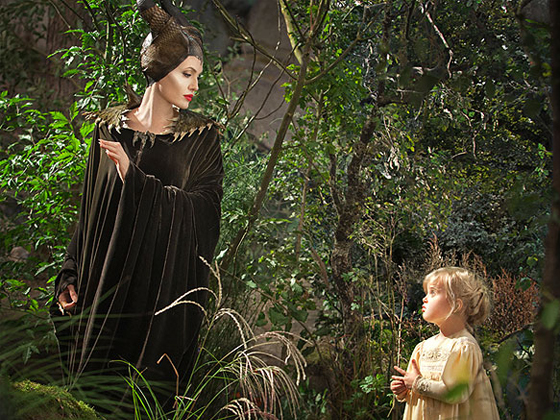
At its simplest, Maleficent, starring Angelina Jolie, is the live-action retelling of Sleeping Beauty from the sorceress's perspective. What it wants to be, however, is something much more ambitious.
Dark, brooding and with a decidedly feminist bent, the film attempts to represent all facets of womanhood, punish the patriarchy for trying to usurp female power, upend fairy-tale clichés and – very occasionally – be funny. It's no surprise the violent fantasy film (for kids!) can't quite get its muscular wings around all that.
As is often the case with villains, Maleficent wasn't born bad. The young fairy (played as a girl by Isobelle Molloy) actually is quite a delightful sprite, making friends with all sorts of magical creatures and flying around her beloved moors, protecting them from human intrusion – until one particular human crosses the boundary. His name is Stefan (Michael Higgins), and he's the love of Maleficent's life. They carry on a cross-cultural romance for years, until Stefan grows older and colder, the ambitions of the wicked humans clouding his judgment.
Here I must warn you that what happens next is extremely disturbing – not for kids, but for adults. When they're quite grown up, Stefan (Sharlto Copley) betrays Maleficent in a way that is grotesque and violent, a clear allegory for sexual assault. Your kids probably won't pick up on the subtext. They'll see a terribly cruel act, not one that cuts to the vulnerability of the victimized, but it's important to mention it nonetheless. Unsurprisingly, the betrayal turns the fairy's heart dark, leading her to curse Stefan's baby girl Aurora (played at one point by Jolie's own daughter Vivienne) with the sleep of death.
It's then that Maleficent suddenly remembers that a sense of humor might be a good idea. The swing in tone is dizzying, as the film morphs from the darkest of melodramas to a chirpy farce, as we watch baby Aurora (Elle Fanning) grow into a young woman, tended by a triumvirate of dimwitted pixies. But they're not the only ones keeping tabs. Maleficent, as menacing as ever with her leather-clad horns and cheeks that could cut ice, develops a soft spot for the girl. The warrior fairy who once took on an army to protect the moors suddenly becomes, well, maternal.
That dichotomy is where the film really wants to live, exploring what it means to be a woman, in all our strength, complexity and vulnerability. And in our rage. Because Maleficent's anger isn't just the cackling of a blighted she-devil; it is defensible, wrenching, a solid meaty thing that feeds the soul of one who's had so much taken from her. That surrogate motherhood is what eventually quells that fury is no negation of the film's feminist principles, but a celebration of them. Maleficent is every woman – the mom, the militant, the protector, and yes, the vengeful shrew.
